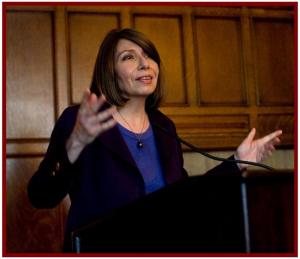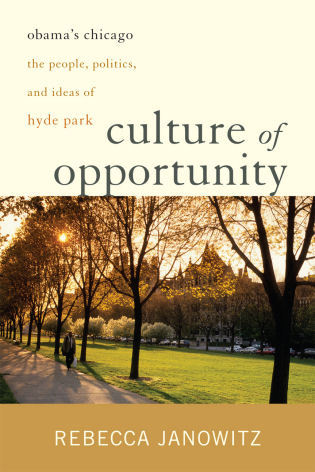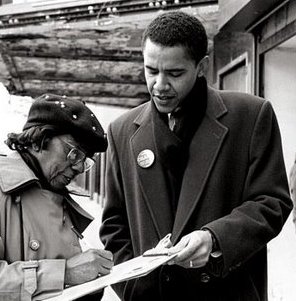 Rebecca Janowitz is a lawyer, committed public servant, and the author of the fascinating new book Culture of Opportunity: Obama’s Chicago – The People, Politics, and Ideas of Hyde Park. Written from her informed perspective as a long-time community insider, her book is an engaging exploration of how Hyde Park’s unique blend of independent politics, social activism, and racial diversity has helped nurture the careers of such politicans as Barack Obama, Harold Washington, and Toni Preckwinkle. On Sunday, January 23rd, you can hear Ms. Janowitz read from Culture of Opportunity when she visits EPL’s 1st Floor Community Meeting Room at 3 p.m. In anticipation of her visit, we recently spoke with her via email about her life in Hyde Park, Chicago’s mayoral race, Hyde Park’s relationship with the University of Chicago, and the future challenges the neighborhood must face .
Rebecca Janowitz is a lawyer, committed public servant, and the author of the fascinating new book Culture of Opportunity: Obama’s Chicago – The People, Politics, and Ideas of Hyde Park. Written from her informed perspective as a long-time community insider, her book is an engaging exploration of how Hyde Park’s unique blend of independent politics, social activism, and racial diversity has helped nurture the careers of such politicans as Barack Obama, Harold Washington, and Toni Preckwinkle. On Sunday, January 23rd, you can hear Ms. Janowitz read from Culture of Opportunity when she visits EPL’s 1st Floor Community Meeting Room at 3 p.m. In anticipation of her visit, we recently spoke with her via email about her life in Hyde Park, Chicago’s mayoral race, Hyde Park’s relationship with the University of Chicago, and the future challenges the neighborhood must face .
Evanston Public Library: After reading Culture of Opportunity, it is clear that your portrait of Hyde Park is written from “the perspective of an expert insider” with long ties to the community. Can you give us a window into your life in Hyde Park? In what ways are you currently active in the community, and how have you been involved in the past? What still draws you to Hyde Park? What would you change?
Rebecca Janowitz: I moved to Hyde Park unwillingly when I was almost eight years old. I wanted to attend the third grade at Burns Park Elementary School in Ann Arbor, Michigan where I had attended first and second grade. It was the library at the Lab School in Hyde Park that won me over. Burns Park’s library had a strict system. First graders could check out books from the lowest shelf, second graders the next and so on. When I asked the Lab School librarian which shelf I was allowed to choose books from, she thought I was nuts. While I have not always lived in Hyde Park, I have lived there for many years. I raised two sons in Hyde Park. I founded the 57th Street Children’s Book Fair which celebrates its 25th year this September. I have served on various local boards of directors and on two Local School Councils. Recently I have thought about moving even though I love being able to walk to bookstores and my synagogue. Over the last decade Hyde Park’s increasingly elderly activists have tended to focus on their own needs, ignoring the needs of young families. This troubles me.
 EPL: Can you tell us about your experiences writing Culture of Opportunity? What first motivated you to write the book? How much research was required? Was your local library involved in the process?
EPL: Can you tell us about your experiences writing Culture of Opportunity? What first motivated you to write the book? How much research was required? Was your local library involved in the process?
RJ: I found writing the book an intense and scary experience that took me right to the edge of my abilities. However, researching the book was pure pleasure. I worked in my local Blackstone Public Library and found it a beautiful oasis. I worked in Regenstein’s Special Collections and received wonderful help from the staff there. But my favorite library experience was the Chicago Collection at the Harold Washington Library. That is a great place to do research. The biggest thrill for me was getting to hold an early edition of If Christ Came to Chicago in my hands and see the still vibrant colors of the map of sinful activities in the First Ward.
EPL: The University of Chicago has been incredibly influential in shaping the community of Hyde Park. In Evanston, Northwestern University has had a similar impact. However, reconciling the goals of a major university and its surrounding community is not always a simple task. Can you characterize the relationship between the University of Chicago and the Hyde Park community unaffiliated with the school? What challenges has their relationship faced, and how have they overcome them?
RJ: The best consequences for the community stemming from the University of Chicago’s presence came from the talented efforts of faculty members, students and administrators who did good work on behalf of the neighborhood. The contributions of the faculty have far outweighed the administrators with a few sterling exceptions. In the past a lot of the heavy lifting was done by the now extinct species of faculty wife. Women have gained a lot of ground, but community institutions benefit less from their unpaid efforts. Neighbors affiliated with the university and neighbors who were non-affiliated often had the same goals. When this mutual interest brought people together wonderful progress was made. The current University administration is too inept to sponsor that kind of effort. Moreover the university was once represented on joint projects with the community by enthusiastic, often competent, and usually independently minded members of faculty. Today the university is represented only by much less competent staff members who will never challenge the administrators who pay them.
EPL: Throughout Culture of Opportunity, you describe Hyde Parkers’ aversion to “machine politics” and write in the final chapter, “Many Hyde Parkers, especially older residents, think that Hyde Park politicians exist to oppose any mayor named Daley.” What has been the reaction in Hyde Park to the current Mayor Daley’s decision not to seek re-election? What changes would the community like to see come to the mayor’s office? How have Hyde Parkers responded to the candidacy of Carol Moseley Braun?
RJ: Daley’s decision was a shock and people in Hyde Park and elsewhere are still coming to terms with it. I am excited that the city council might become a legislative body. Will Burns who is running for the Fourth Ward seat that Toni Preckwinkle vacated has been a state legislator. I expect him to be a leader in the new council. He might well be a strong mayoral candidate in four years. Carol Moseley Braun continues to disappoint. She has not been involved with any of the efforts to improve South Side communities over the last decade. Many of these efforts have been both creative and successful, and her apparent indifference amazed me.

EPL: President Obama is the most successful of a long line of Hyde Park political leaders including Senator Paul Douglas, Alderman Earl Dickerson, Alderman Leon Despres, and State Representative Barbara Flynn Currie. How do Hyde Parkers seem to grade his presidency so far? What do they hope to see from President Obama during the remainder of his term? How have Hyde Parkers reacted to Bill Daley’s appointment as the new chief of staff?
RJ: In general, Hyde Parkers remain hopeful that Obama will hit his stride. People respect Bill Daley but some question the continuing reliance on so many people from Chicago.
EPL: Another successful Hyde Park political leader is the new Cook County Board President Toni Preckwinkle. How has Hyde Park nurtured her political career and prepared her for the sizable challenge of presiding over Cook County government?
RJ: Hyde Park fostered Toni’s career in much the way the neighborhood helped Obama. Hyde Park and Kenwood provided her with a racially-mixed and reform-minded base. Unlike Obama she chose to oppose Daley. I think that provides her with crucial experience of being in the opposition. She faces enormous resistance to reform. Hopefully her long years in isolated opposition on the council have given her the fortitude she will need.
EPL: What do you see as being the greatest future challenges for the Hyde Park community? How do you think Hyde Parkers will respond?
RJ: Hyde Park‘s population is too old and not dense enough to sustain a healthy mix of institutions and amenities. To rebuild the community two things will have to happen. First, priorities within the neighborhood will have to change to respond to the needs of young families including those not affiliated with the university. Second, the neighborhood has to work more closely with surrounding communities to bolster the amenities available to residents and improve public education. I don’t know if the critical mass of younger Hyde Parkers needed to undertake this work exists.
EPL: In your introduction to Culture of Opportunity you write, “My greatest regret about the book as it stands is the number of amazing Hyde Parkers who are absent from its pages. This reflects no lack of affection for them or respect for their accomplishments. But the goal here is a portrait of the neighborhood, not an encyclopedia.” Bearing this aim in mind, are there any individuals or community groups you’d like to mention here whom you weren’t able to profile in the book?
RJ: One example of the people I could not fit into the book is Laura Fermi who was married to Enrico Fermi and arrived in Hyde Park as a refugee. Mrs. Fermi became an effective community activist, interested in issues like gun control before they became fashionable. Another person I could not include was my mother Gayle Janowitz. There is a lot of interesting stuff to explore in regard to women and the political and scholarly interaction of Blacks and Jews.
EPL: What are your plans now that Culture of Opportunity has been published? Do you have any new projects in the works? Can we look forward to another book sometime in the future?
RJ: I am currently deeply involved in my work at Cook County Jail. I don’t expect to have time for research or writing in the next few years. I am interested in writing a short polemic about high school.
Interview by Russell Johnson
